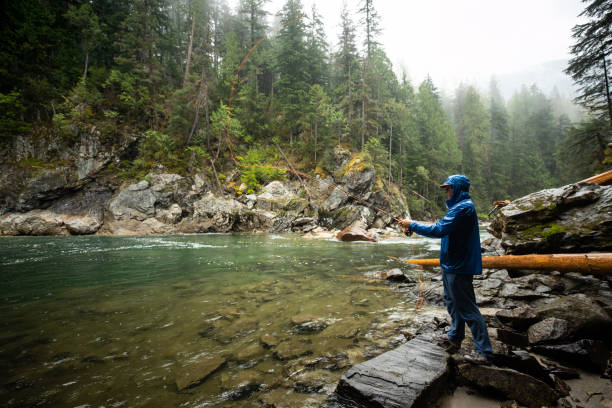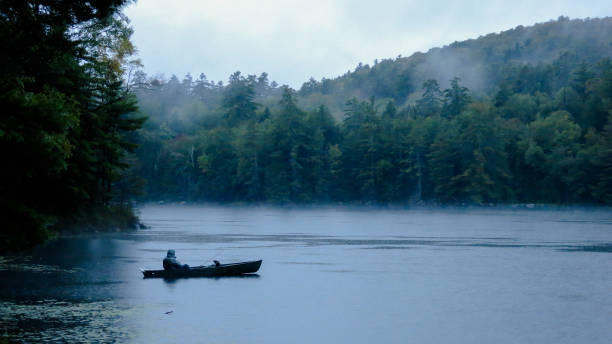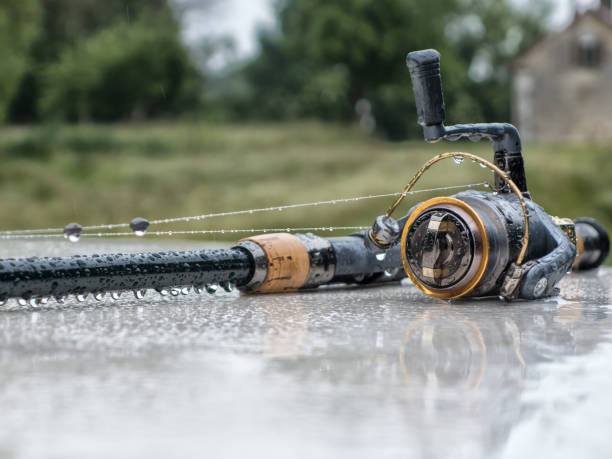You’ll hear this a lot: when it rains, fish bite well, and that’s when you should go fishing. Don’t we all recognize the stereotypical fisherman with the yellow rain poncho on the back?
Although fish do bite when it rains, their activity is typically lower. Although oxygenation and coloration of the water are two very advantageous aspects of rain for fishing, the fish appear to require some time to adapt to the sudden change. That’s why you ought to concentrate on fishing immediately following a downpour instead!
But by rejecting these widely held notions, you can both stay relatively dry and greatly improve your fishing. Learn why and when you ought to go fishing in the following paragraphs.
Table of Contents
Pros of Fishing in the Rain
Fishing in the rain can increase your catch rates, which is its first advantage. This is because rain frequently stirs up the water, causing fish to become more active.
This increases the likelihood that they will take your bait, increasing your chances of landing a catch. Since they can access less populated areas where the fish aren’t typically disturbed by boaters, many kayakers will set out during light rain in order to take advantage of this period when the fish are more active.
Those looking for alternatives to shore fishing should research the best fishing kayaks under $1,000.
Fishing in the rain has the added benefit of providing a cool-down after a hot day. Going outside in the rain can be a great way to cool off while continuing to engage in your favorite hobby on a hot day when you don’t want to be in the sun. Near run-offs, a feeding frenzy will result from heavy rains agitating aquatic organisms in the water.
Finally, fishing in the rain can be more tranquil and soothing. There’s something about being outside in the rainy season that can help you unwind and focus. Fishing in the rain might be the ideal stress-reduction activity.

Cons of Fishing in the Rain
Of course, there are some disadvantages to fishing in the rain. One of the biggest is that staying dry can be challenging. Lack of the proper equipment can result in you getting soaked, which can be uncomfortable (and cold if it’s winter).
It may be more difficult to see your line and bait when fishing in wet conditions, which is another drawback. Because of this, more fish are lost because it is harder to detect bites.
Rainfall reduces water clarity, making it more challenging to spot bass, trout, and other fish.
Last but not least, unfavorable weather can ruin a good time. It’s likely that you won’t have a good time if it’s pouring rain and you’re cold and wet. When fishing in the rain, make sure you are wearing the appropriate clothing and equipment. Get the best fishing shoes you can afford; they will come in handy during these times.
Can You Catch Fish When It Rains?
For both the fish that live in our water systems and systems, rain is crucial. In addition to causing rivers to flow, it also makes the water murky and darker, adds oxygen to the water during the hot summer months, and can flush food into the water (worms, insects, etc.).
Since murkier water is darker and less transparent to light, both prey and predator fish tend to be more active in it.
Overall, rain is fantastic news for fishermen, but there is a problem! The changes brought on by the rain take some time for fish to adapt to. Therefore, fishing is frequently not very good when it rains.
Of course, there are exceptions to every rule, but the majority of fishermen will tell you that they hardly ever succeed in catching fish when it is pouring.

5 Tips for Fishing in the Rain
1. Since the water is clearer and more still during a sunny day without nearby storms, the fish are more likely to notice our presence and the techniques we employ to catch them.
2. Since there is less light in the water, the fish concentrate more on feeding when the day is mostly cloudy and there is a light breeze. As an illustration, when it is windier and darker at night, fish are more likely to act on instinct, which lessens fights.
3. According to research, some fish must move less when the barometric pressure drops, so they attack dead prey instead. Conversely, when the barometer rises, the fish become more active than usual and therefore have more “encouragement” to search for live food.
4. When the temperature is drastically changed from hot to cold, most fish start to lose their freshness. In contrast, when it rises, they become more alert, with the exception of some species that are similar, which become drowsy when the oxygenation of the water decreases and the increase in degrees.
5. Insects enter the water as a result of rain. The fish are prompted to search for them as a result. On the other hand, if it rains a lot, it makes it difficult for them to see because of the mud and keeps them from eating or finding food quickly.
Most seasoned anglers advise casting in the rain during comfortable weather. The best time to go if it has recently rained is right before the upcoming storm that is predicted. When temperatures are moderate, baitfish will migrate to locations where they can maximize their metabolism and feel secure. They cannot control their body temperature because they are cold-blooded. As a result, they must determine their ideal temperature for sustainability. When the temperature is not ideal, their bodies adapt and either increase or decrease their metabolism.
When searching for a particular species of fish, knowing the ideal temperature range will be useful. When intending to fish immediately after, the water temperature may, however, be the most important factor. Or incorporate it when it’s raining.
Snook and other fish will become more active if it rains while it is hot outside and the water is already warm. The best time to go fishing in the rain is right now. Carp are frequently seen soaking up the sun in weeds and along shorelines.
However, this time will not be ideal for fishing in the rain if the weather was hot or cold and then it rains when it is very cold. Fish become less active as a result of the water becoming unsuitable for swimming. Carp are therefore less likely to be discovered wading through vegetation, and snook and other fish won’t have as much energy to be active.
Conclusion: It Depends
In summary, it depends on the individual whether rain is good or bad for fishing. While some people avoid it, others swear by fishing in the rain. Consider as many different factors as you can. Above all, though, don’t let a little rain keep you from getting out on the water or from staying out there. The best time to go fishing is when you have the time to do so. Never assume that you are missing something.


